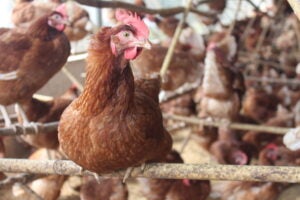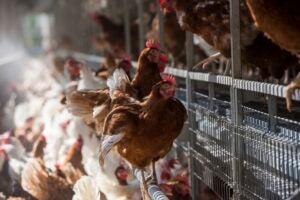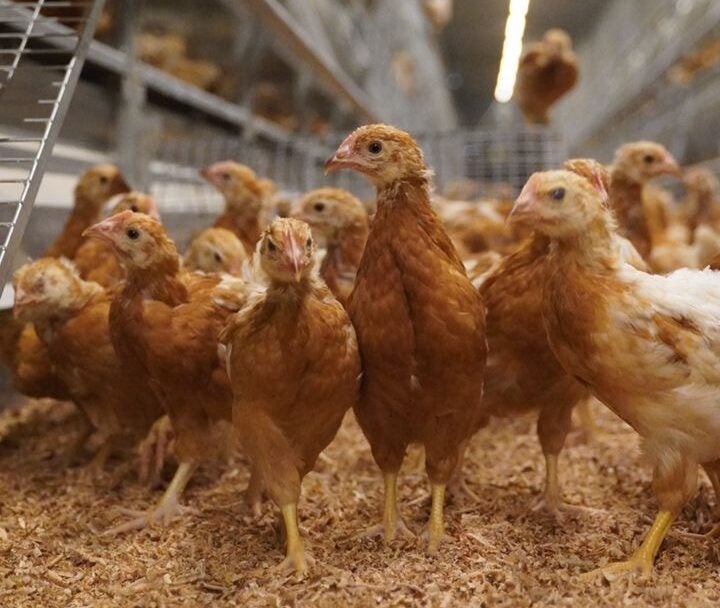
LONDON—Two mother pigs, who have spent around a quarter of their adult lives confined in metal cages barely bigger than their bodies, have been rescued from slaughter and rehomed by leading animal protection charity Humane Society International/UK. The pigs, who gave birth to multiple litters of piglets at a UK farm which cages sows for weeks around the time they give birth, were willingly relinquished to HSI/UK in support of the charity’s Crate Escape campaign to ban use of the cruel cages known as farrowing crates.
Every year on UK farms, around 200,000 sows are confined for up to five weeks at a time, several times a year, in metal cages so small they can’t even turn around, causing them physical and mental suffering. At just a few years of age, having been repeatedly bred but no longer considered productive, the two pigs were due to be sent to slaughter but instead the farmer entrusted them to HSI/UK to live the rest of their lives in freedom and as campaign ambassadors.
Photos and video footage of the two pigs before and after their rescue, can be downloaded here.
Photos of pigs in farrowing crates on the farm, including a range of health problems, can be downloaded here.
The farmer who gave up the pigs wishes to remain anonymous but believes that farrowing crates are cruel and hopes the pigs’ story will help HSI/UK persuade politicians to ban the practice. The farm has used farrowing crates for over 35 years, but the farmer now believes that farmers should be supported financially to end their use because of the suffering endured by pigs. The farmer told HSI/UK: “It’s hard watching them so upset. When an animal’s telling you ‘I do not want to be in here, I’m going to do my best to escape’ and then you’re like, ‘I’m going to have to tie you in’, that feels cruel. It bothers me every day.”
They added: “I really hope that we move on from this sort of barbaric cage. It doesn’t have to be this way, there are loads of different kinds of free farrowing systems but why aren’t retailers and consumers asking for them? It feels like they don’t know the reality of what’s going on behind farm gates. I think we do really need to change the script. We’ve got to have support from governments – both the money and the right policies. I don’t think putting sows through weeks of crate confinement six, seven or eight times in their lives can be justified any more.”
Claire Bass, senior director of campaigns and public affairs at Humane Society International/UK, who helped to rescue the pigs, said: “Across the UK right now some 200,000 mother pigs are hidden away suffering behind bars. Such big numbers can mask the fact that each one is an intelligent, sensitive individual. Studies have found that pigs are smarter than dogs and even 3-year-old children, and yet they are routinely subjected to this appalling cruelty. That’s why it is so important that we were able to rescue them and tell the stories of these two mums. The farmer’s account of the suffering caused by crates is heartbreaking and dealing with distressed and depressed animals takes its toll on farmers’ mental health.
Almost two-thirds of British people have never heard of farrowing crates, meaning that they’re also unaware of the intense suffering that they cause. Few people would dream of keeping a dog confined in a metal crate so small they couldn’t even turn around for five long weeks, and our Crate Escape campaign aims to create the same compassion and respect for pigs. We’re urging all governments in the UK, as well as retailers, to commit to supporting farmers financially to get rid of these cruel and unnecessary cages for mother pigs.”
The pigs – who will soon be named by HSI/UK’s supporters – have been given a permanent home at Hopefield Animal Sanctuary in Brentwood, Essex. At the sanctuary they will be free to stretch their legs on grass, root around in the mud, and carry out all the other natural behaviours that were denied to them during their time in farrowing crates.
HSI/UK is calling on all political parties to commit to banning farrowing crates and providing support to farmers to help them move away from using these archaic and cruel confinement devices. Take action for mother pigs by signing the petition here.
Notes
- Polling data shows that 63% of British people have not heard of farrowing crates.
- Fewer than one in five people in Britain (19.8%) support the use of pig farrowing crates once the intended purpose (protecting piglets from being crushed) and the movement restrictions imposed by farrowing crates are described to them.
- Two-thirds of those polled would support governments providing financial support to farmers to transition away from using the devices, and only 15.5% would oppose a ban.
- Polling was carried out by Survation via online panel, with 1,074 total UK respondents, in March 2023.
- The full interview with the farmer is available here.
ENDS
Media contact: Sally Ivens, media and communications senior specialist at HSI/UK: sivens@hsi.org ; 07590 559299




















